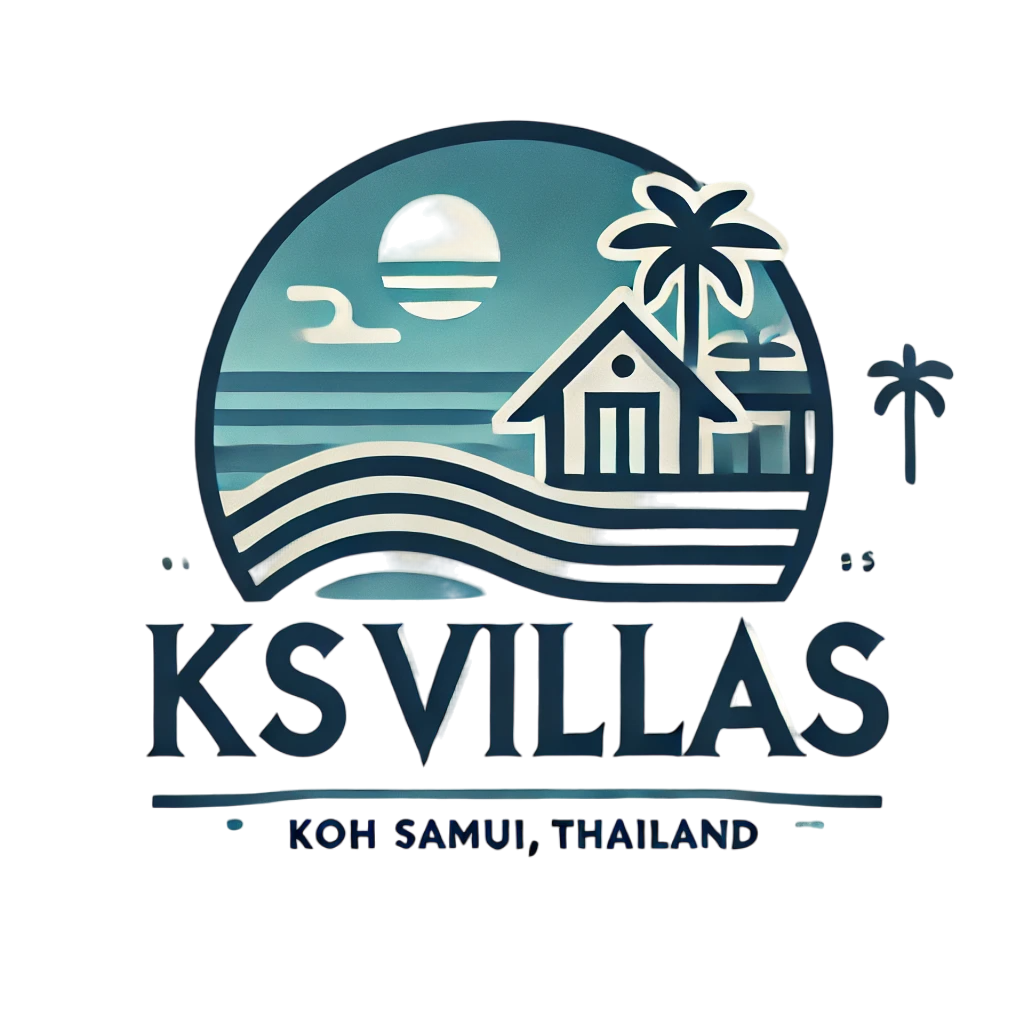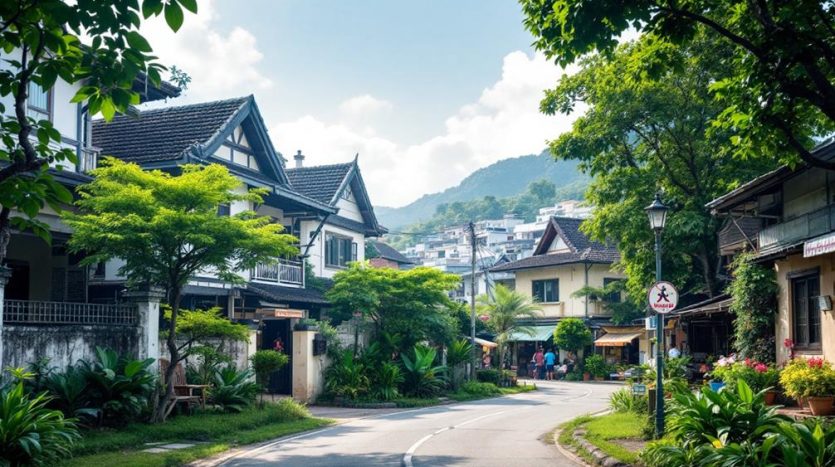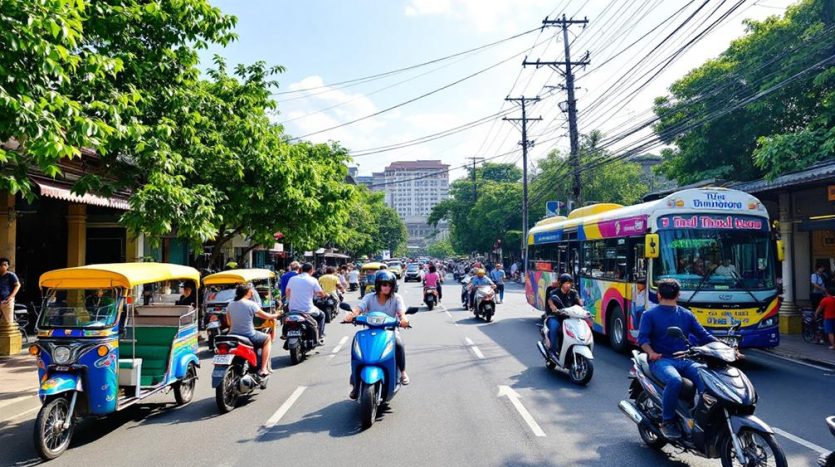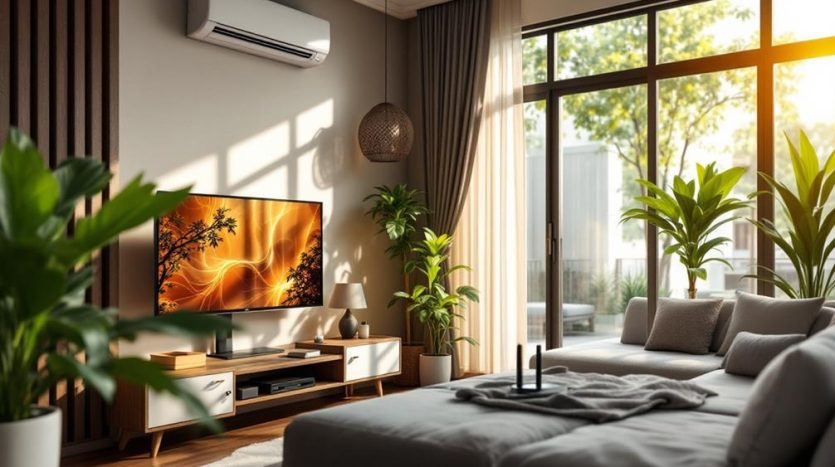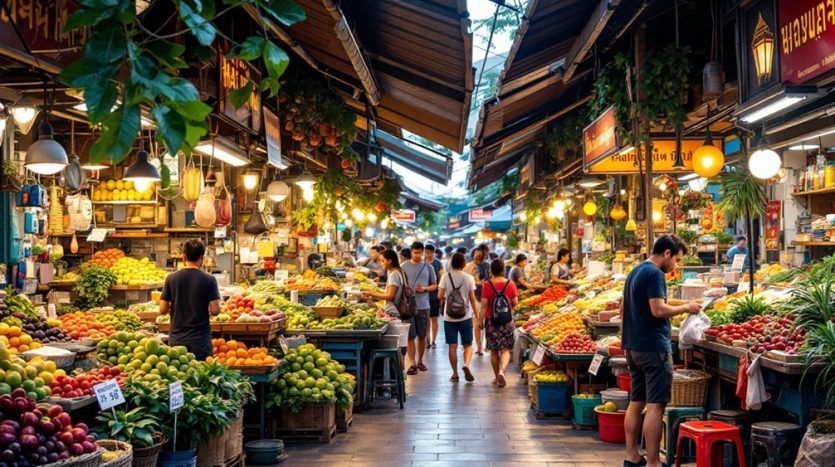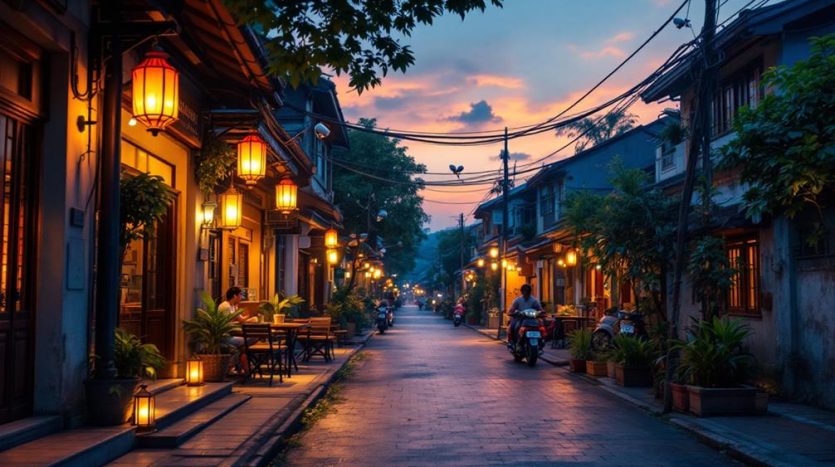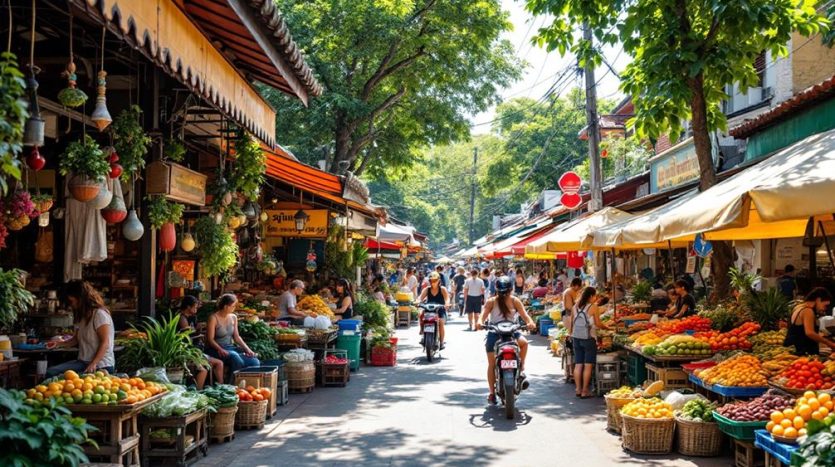Can I Live on $3,000 a Month in Thailand?
Thinking about making a move to Thailand with a budget of $3,000 a month? You might be surprised by how far your money can go in this vibrant country. Whether you're eyeing a cozy studio or a more luxurious abode, housing options are diverse and often affordable. Enjoying local cuisine can keep your food costs low, and getting around won't break the bank either. Yet, before you pack your bags, consider the full picture of living expenses beyond just rent and groceries. What about healthcare, utilities, or the hidden costs you might not expect? Let's explore these considerations further.
Key Takeaways
- A $3,000 monthly budget in Thailand is feasible with careful planning across housing, food, and transportation.
- Affordable housing is available, with rent ranging from $300 for a studio to $1,500 for a luxury apartment.
- Dining costs vary; street food is inexpensive, while expat and fine dining require higher spending.
- Public transportation and motorbike rentals are cost-effective, while taxis and ridesharing apps are reasonably priced.
- Healthcare in Thailand is affordable, with insurance premiums between $50-$150 and clinic visits costing $10-$30.
Cost of Housing
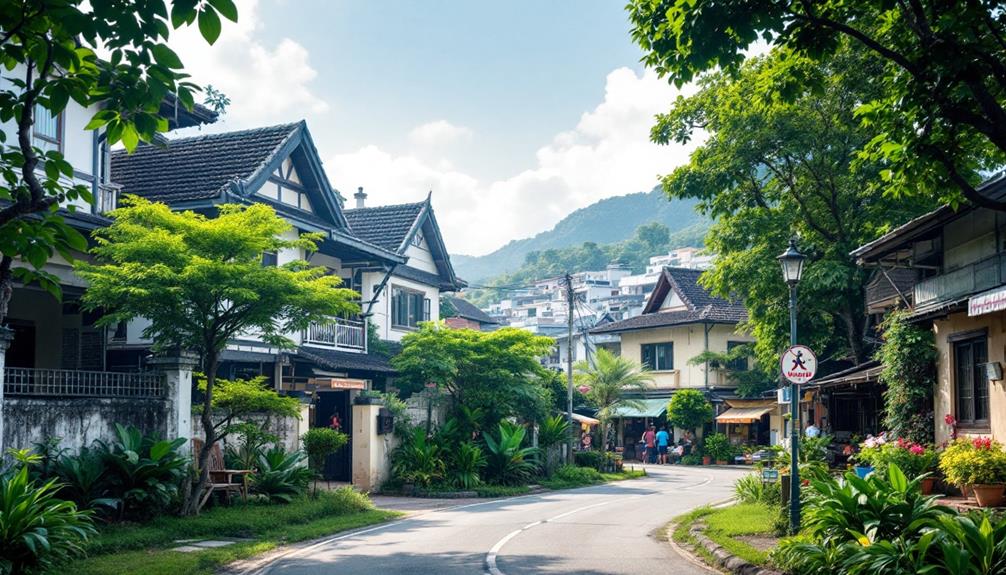
When considering the cost of housing in Thailand, it's crucial to understand the range of options available. You've got everything from high-rise condos in buzzing Bangkok to serene villas along the coast. The housing types vary widely, and so do the prices. A cozy studio might set you back a mere $300 a month, while a luxury apartment in a prime location could easily gobble up $1,500 of your budget.
It's important to read rental agreements thoroughly, as tenant rights in Thailand include necessary repairs and notice before landlord visits. Diving into rental agreements, you'll find that most require a one-year commitment, though shorter terms are negotiable—if you can master the art of charming your landlord. Deposits typically equal two months' rent, which is standard in the housing market.
Exploring local neighborhoods is key. In Bangkok, areas like Sukhumvit are pricier but come with perks like easy access to public transport and hip cafes. Meanwhile, Chiang Mai offers more affordable options if you're keen on a quieter lifestyle minus the urban chaos.
Food and Dining
Maneuvering the food and dining scene in Thailand on a $3,000 monthly budget is both feasible and delightful. Embrace the vibrant local cuisine by indulging in street food, where a savory Pad Thai or green curry costs less than your last impulse online purchase. Trust me, dining experiences here won't break the bank. Check out the table below for a snapshot of your gastronomic journey:
| Dining Option | Average Cost (THB) |
|---|---|
| Street Food | 30 – 60 |
| Casual Restaurant | 100 – 250 |
| Expat Favorites | 300 – 500 |
| Fine Dining | 1,000+ |
Street vendors provide the ultimate budget-friendly feast, but don't shy away from exploring food markets for fresh ingredients. Cooking at home is not only cost-effective but also allows you to experiment with dietary options that suit your taste.
If you're craving a Western meal, brace yourself—expat favorites can be pricey. Yet, even restaurant costs for these comforts are manageable within your budget. So, whether you're dining like a king or enjoying home-cooked delights, Thailand offers an affordable culinary adventure. Just remember, your taste buds will be thrilled, and your wallet will thank you!
Transportation Options
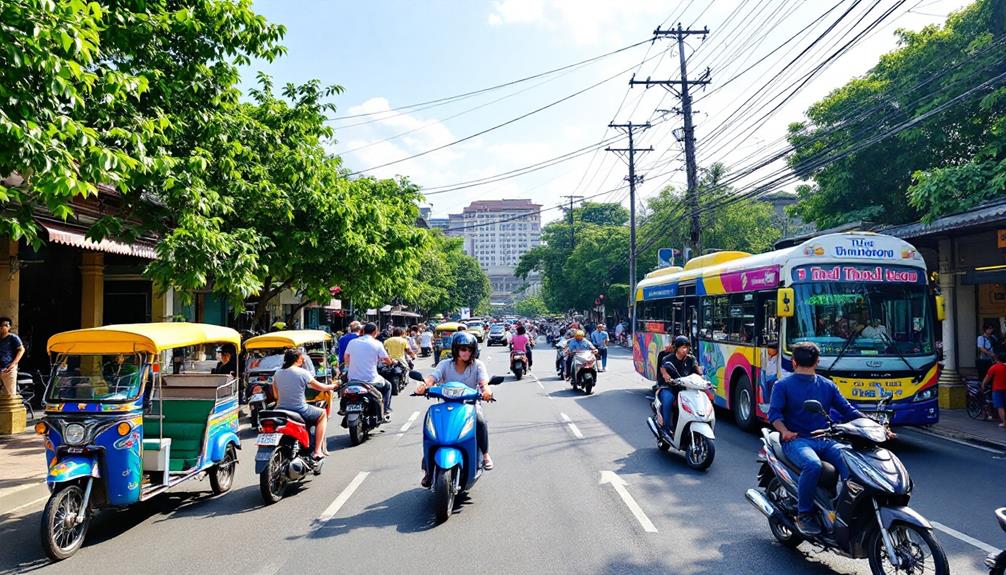
When living in Thailand on $3,000 a month, you'll find that transportation options are both diverse and cost-effective.
Public transit choices like buses and trains are available at low fares, often under $1 per trip.
Renting motorbikes offers flexibility and typically costs around $60 to $100 monthly, while taxis and ridesharing services like Grab provide convenience with fares averaging $5 to $10 for short distances.
Additionally, bicycles present an eco-friendly and low-cost transportation method, ideal for traversing urban areas.
Public Transit Choices
Traversing Thailand's public transit system can be both economical and efficient, providing various options for different needs and budgets. Immerse yourself in Bangkok's BTS Skytrain and MRT Subway for a smooth ride through the city, where air conditioning is as essential as a compass in the jungle. With fares starting around 16 THB (a mere $0.50), you'd be hard-pressed to find a better deal unless you're riding a unicorn.
Local buses, on the other hand, offer a more rustic experience, where fares are low, but the adventure is high. For a more thrilling escapade, hop on a tuk tuk. They're like a rollercoaster without a safety bar, but remember to haggle, or you might pay more than what's in your wallet.
Ferry services whisk you across the Chao Phraya River, offering a scenic view that could inspire your next Instagram post. Prefer two wheels? Bicycle rentals are available, though they might test your pedal power.
Walking tours provide exercise and the chance to dodge more vehicles than you'd expect. And for the tech-savvy, ride hailing apps guarantee you won't have to decipher bus schedules.
Renting Motorbikes
Exploring Thailand on two wheels is an exhilarating option, with motorbike rentals offering both affordability and flexibility. Renting a motorbike can cost as little as $60 to $100 monthly, perfect for a budget of $3,000. But hey, don't let the wind in your hair fool you—safety gear is a must-have accessory, not just for those Instagram-worthy selfies.
Here's a quick breakdown of motorbike rental costs and safety gear expenses:
| Item | Cost (USD) |
|---|---|
| Monthly Rental | $60 – $100 |
| Helmet | $10 – $20 |
| Protective Jacket | $30 – $50 |
| Gloves | $5 – $15 |
You'll find motorbike rentals almost everywhere—just like 7-Elevens in Thailand. Always check the condition of the bike before you hit the road. Make sure the brakes work; you don't want your heart racing for the wrong reasons. Keep your eyes peeled for potholes; they're like surprise parties you didn't ask for. By the way, always carry your international driving permit. It's like a backstage pass—without it, local authorities might not be impressed with your road warrior skills. Remember, safety gear is your best friend when maneuvering those bustling streets.
Taxi and Ridesharing
Taxi and ridesharing services in Thailand provide convenient and often economical transportation options, especially for those on a $3,000 monthly budget. An affordability analysis of taxi fares reveals that short trips cost around $1.50, making them a wallet-friendly choice for local transportation. Ridesharing apps like Grab and Bolt offer competitive rates, with a typical ride costing between $3 and $5. It's enough to make you consider becoming a full-time passenger if only there were frequent flyer miles for taxis.
Service quality can vary, but most ridesharing apps boast user ratings, so you know whether your driver is a chatty Cathy or the silent type who won't mind if you nap. Safety measures are generally solid, with features like GPS tracking and driver background checks adding peace of mind.
But remember, Thailand's traffic conditions can transform your Zen-like state into an existential crisis during rush hour.
With diverse ride options ranging from motorbikes to sedans, you'll find something that suits your mood—whether you want to feel the wind in your hair or just pretend you're in a James Bond movie. So, buckle up and enjoy the ride, literally!
Healthcare Expenses
Healthcare expenses in Thailand can be surprisingly affordable, especially for expatriates living on a budget of $3,000 a month. The healthcare quality here rivals Western standards, often at a fraction of the cost. With a plethora of insurance options, you can find coverage that fits your needs and budget. Local clinics provide services at astonishingly low prices, and expat services often cater specifically to foreigners, ensuring language barriers don't leave you lost in translation.
| Expense Type | Estimated Cost (USD) |
|---|---|
| Insurance Premiums | $50 – $150/month |
| Local Clinic Visit | $10 – $30/visit |
| Health Screening | $100 – $200/screen |
| Emergency Services | $100 – $300/incident |
Alternative therapies and traditional medicine offer unique and cost-effective approaches to preventive care, making medical tourism a popular choice. Emergency services are efficient, though hopefully, you won't need to use them often. Regular health screenings are recommended, and you'll find these services both thorough and wallet-friendly.
Utilities and Internet
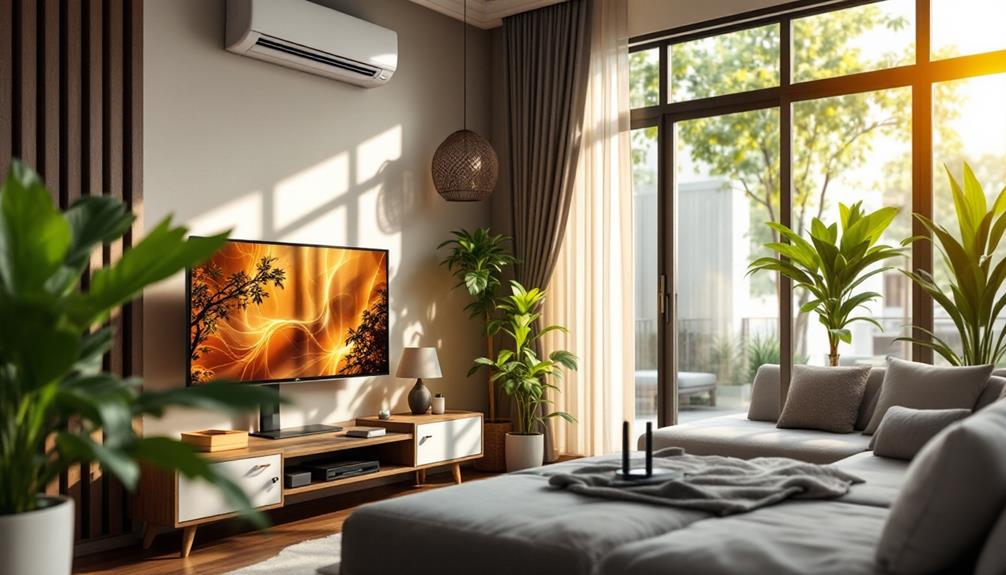
When living in Thailand on $3,000 a month, you'll find that utility costs are quite manageable, averaging around $50 to $100 per month depending on your usage and location.
High-speed internet services offer a range of affordable options, with plans starting at approximately $20 per month.
It's important to factor in additional costs such as maintenance costs for property investments, which can influence your overall budget.
Average Monthly Utility Costs
Though Thailand offers an affordable cost of living, understanding the average monthly utility costs is essential for effective budgeting. Let's face it, nothing's worse than an unexpected utility bill that could double as your horror movie villain. To keep those surprises at bay, let's look at the numbers. Utility providers in Thailand typically charge between $50 to $100 per month for electricity, depending on your energy efficiency habits. Those who love their air conditioning might find themselves on the higher end of that spectrum. Water bills are delightfully low, often around $10 to $20, leaving you more baht for your favorite street food.
Here's a breakdown of average monthly utility costs:
| Utility Type | Low Estimate ($) | High Estimate ($) |
|---|---|---|
| Electricity | 50 | 100 |
| Water | 10 | 20 |
| Gas | 10 | 20 |
| Trash Service | 5 | 10 |
It's clear that staying mindful of your energy efficiency can have a tangible impact on your monthly budget. With these numbers in mind, you can enjoy Thailand's affordable lifestyle without your wallet feeling like it's taken a sun-soaked vacation of its own.
Affordable Internet Options
As you traverse the options for affordable internet in Thailand, it's crucial to contemplate both cost and speed to confirm you're getting the best value for your money.
With Wi Fi availability being as common as tuk-tuks in Bangkok, you won't have to look far for connectivity. Most apartments offer high-speed internet as part of their utility package, and if not, setting it up won't break the bank, typically costing around 600 to 1,200 THB per month.
That's less than the price of a fancy dinner for two, but unlike the dinner, this will last all month.
If you're more of a nomad, Internet cafes are your best friend. They're scattered across cities like confetti, offering speeds that'll let you video-call home without sounding like a robot.
For a mobile lifestyle, mobile plans are the way to go. Major carriers offer data packages starting at 299 THB per month for a decent chunk of data.
Whether you're binging on cat videos or traversing Google Maps, these data packages confirm you're never left buffering.
Entertainment and Leisure
Exploring entertainment and leisure activities in Thailand while living on $3,000 a month offers a diverse and affordable range of options. If you love cultural activities, you're in luck. Thailand's local festivals are vibrant and frequent, giving you plenty of chances to immerse yourself without emptying your wallet.
For nightlife options, Bangkok and Pattaya are your playgrounds, offering everything from bustling bars to serene jazz clubs. Significantly, urban living in Bangkok provides access to a plethora of entertainment options, yet it's important to take into account the higher living costs associated with city amenities.
Outdoor adventures await you with lush national parks and beautiful beaches. Whether it's hiking or lounging, the cost is often just a fraction of what you'd pay elsewhere. The arts scene is also thriving, with galleries and theaters showcasing local talent, often for the price of a coffee back home.
To put it simply, your $3,000 budget can cover a variety of experiences:
- Music events: Enjoy live gigs that range from traditional Thai music to international rock bands.
- Wellness retreats: Indulge in affordable spa treatments and yoga sessions.
- Social clubs: Join groups that match your interests, from salsa dancing to book clubs.
- Movie theaters: Catch the latest films at a fraction of Western prices.
Shopping and Groceries
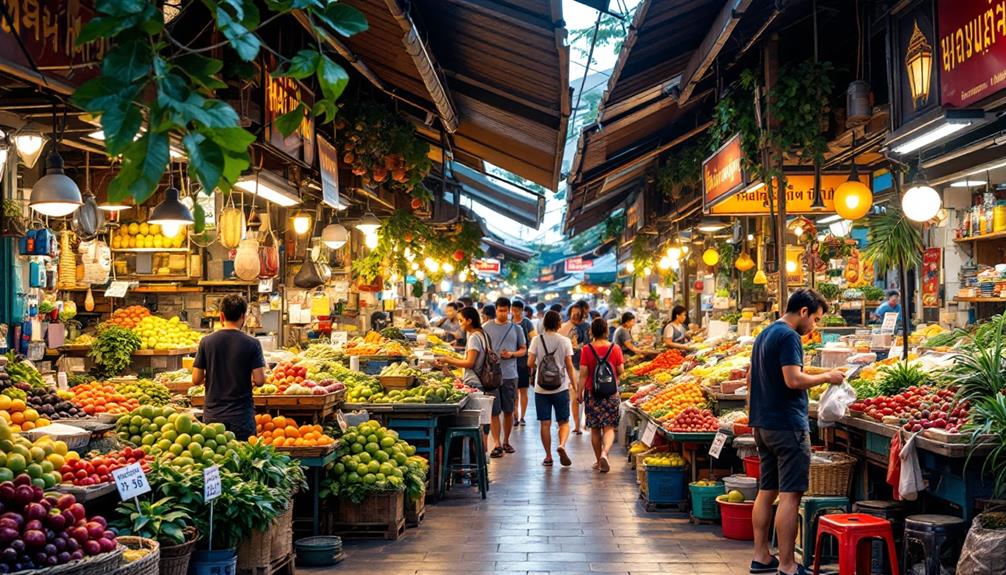
While enjoying Thailand's rich entertainment scene, managing your shopping and grocery expenses becomes equally important when living on a $3,000 monthly budget. Immerse yourself in the vibrant local markets, and you'll find food prices that bring a smile to your face and a spring to your wallet's step. Fresh produce, especially organic produce, is often cheaper than you might expect, making healthy eating a feasible option.
However, keep an eye on those international brands; they're like the VIPs of groceries—exclusive and pricey.
Effective grocery shopping relies on budgeting strategies and meal planning. Prioritize local ingredients and seasonal items to stretch your baht further. If you can't resist that imported cheese, plan accordingly and balance it with locally sourced staples.
Shopping tips include visiting markets early for the freshest picks and bargaining like a pro (or at least trying to).
Analyzing your expenses regularly helps you stay on track. Remember, an occasional splurge won't break the bank if you're diligent elsewhere.
Visa and Legal Fees
Maneuvering through the visa and legal fees associated with living in Thailand is an essential step in maintaining your $3,000 monthly budget.
Because let's face it, you can't just waltz into Thailand and expect them to roll out the red carpet without some paperwork and a few baht.
Visa requirements vary depending on your nationality and length of stay, so don't let the legal processes trip you up.
Here's a breakdown of the essentials:
1. Tourist Visas: Typically cost around $35-60, giving you up to 60 days before you need to start thinking about extensions.
Don't overstay unless you fancy paying a fine of 500 baht ($14) per day.
2. Retirement Visas: If you're of a certain age (50+), this option requires a financial proof of 800,000 baht ($22,000) in a Thai bank account, plus a yearly renewal fee of about 1,900 baht ($55).
3. Education Visas: For those embracing lifelong learning, expect fees ranging from $70-100, plus a little extra for language classes.
4. Work Permits: If you're planning to earn your keep, anticipate a fee of around 3,000 baht ($86), plus a few hoops to jump through.
Travel and Excursions

Once you've navigated the intricacies of visas and legalities, allocating part of your $3,000 monthly budget to travel and excursions can enrich your experience in Thailand.
Consider this: a typical beach excursion to islands like Koh Samui can cost around $50, including transportation and meals. Cultural tours of Bangkok's temples or Chiang Mai's old city will set you back about $30 per day.
Adventure activities, such as zip-lining or rock climbing, average $60, perfect for the adrenaline junkie in you. Historical sites, like Ayutthaya, offer day trips for about $40, and local festivals—Songkran, anyone?—are often free, though expect to spend on street food and souvenirs.
Nature retreats in the lush north run approximately $100 for a weekend, including lodging. Wildlife encounters, like visiting an ethical elephant sanctuary, can cost around $80.
Culinary experiences vary, from $20 for a cooking class to a $5 street food binge. Spiritual retreats, ideal for seeking zen amidst the chaos, start at $150 for a weekend.
Eco tours, focusing on sustainability, can range from $70 to $150. With smart planning, you'll explore Thailand's diverse offerings without breaking the bank—or your spirit.
Language and Communication
When living in Thailand on $3,000 a month, understanding basic Thai phrases can greatly enhance your daily interactions, as data indicates that only about 27% of the population speaks English proficiently.
You'll find that English proficiency levels are higher in urban areas like Bangkok but lower in rural regions.
As a result, investing time in learning common Thai expressions could improve communication and lead to a more immersive experience.
Basic Thai Phrases
Understanding basic Thai phrases is vital for effective communication and a smoother experience while living in Thailand on $3,000 a month.
You'll want to master some key phrases to navigate daily life and avoid any misunderstandings that might lead to buying a souvenir you didn't bargain for.
Let's break down what's important:
- Basic Greetings: Saying "Sawasdee" (hello) or "Kop khun" (thank you) goes a long way in showing respect. Remember, adding "krub" (for males) or "ka" (for females) makes it polite.
- Essential Vocabulary: Words like "Chai" (yes), "Mai chai" (no), and "Tao rai?" (how much?) are essential. Mispronounce these, and you might end up buying a pet elephant instead of a postcard.
- Food Related Phrases: Knowing "Mai phet" (not spicy) could save your taste buds from a fiery demise. Thai cuisine is known for its heat, even the "mild" dishes.
- Emergency Phrases: "Chuay duay!" (help!) and "Rong phayabaan yoo tee nai?" (where is the hospital?) are indispensable. It's better to have these and not need them than the other way around.
Mastering these won't only help with daily activities but also reveal deeper connections with locals.
English Proficiency Levels
English proficiency levels in Thailand vary considerably, and understanding these differences can greatly enhance your communication experience. While many urban areas boast higher fluency levels, rural regions might leave you playing a game of charades. Don't be surprised if your barista knows more about latte art than the English language.
Language schools pepper the landscape, offering courses to boost those fluency levels. Yet, communication barriers persist, mostly due to local dialects and cultural nuances. You'll find that language schools aren't Hogwarts—you won't be fluent overnight.
Expat interactions provide a unique perspective. You'll meet seasoned expats who navigate these barriers with the grace of a ninja, and newbies who trip over every "sawatdee khrap." For effective conversation practice, consider language exchange programs where you can swap English lessons for Thai insights.
Learning resources abound for those keen to dive deeper, ranging from apps to local meetups. Embrace these tools, and you'll find yourself understanding more than just "Pad Thai" on the menu.
Safety and Security
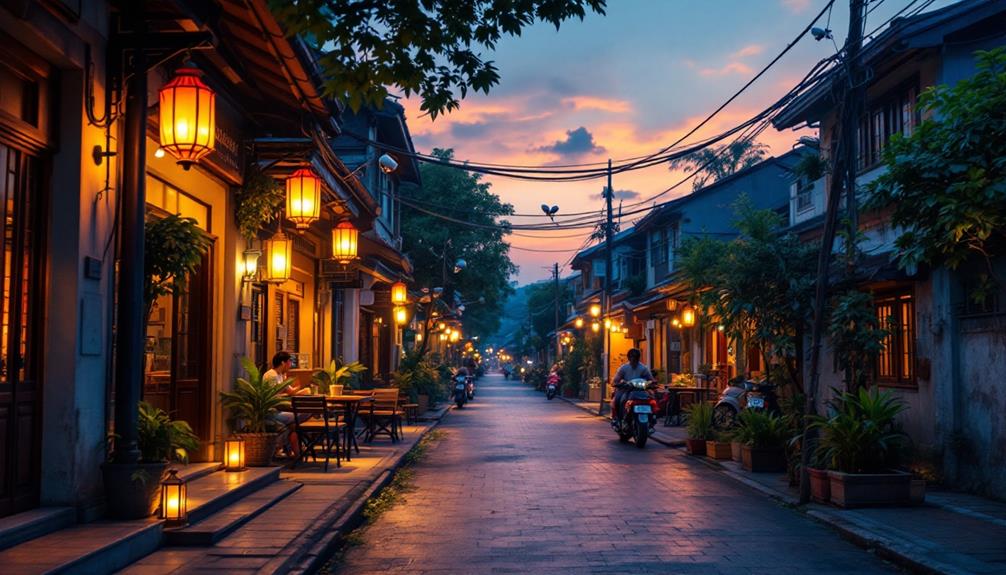
Safety and security are essential considerations for anyone planning to live on $3,000 a month in Thailand. Before you pack your bags, consider the country's crime rates, which are generally low but not nonexistent. Emergency services are reliable, though familiarizing yourself with local numbers is a smart move.
Personal safety is mostly a matter of staying alert, especially in bustling tourist areas where pickpocketing can occur. Understanding local laws and cultural differences can prevent misunderstandings and keep you on the right side of the law.
Expat experiences highlight how neighborhood security varies greatly. Here are some tips to maximize your safety:
- Research neighborhoods: Choose areas with a reputation for low crime rates and strong community ties.
- Be cautious in tourist areas: These spots are often targeted by petty thieves.
- Use theft prevention strategies: Keep belongings secure and avoid displaying valuables.
- Learn the local emergency service numbers: Quick access can be vital in emergencies.
Adapting to cultural differences can also enhance your personal safety, as respecting local customs helps you integrate smoothly.
Balancing these factors will help you enjoy Thailand safely, and with a sense of humor, even when things get a bit… adventurous.
Community and Networking
When living on $3,000 a month in Thailand, building a strong community and network is essential for both social and professional enrichment. You might think you're just here for the pad thai, but the real spice of life comes through connections.
Start by diving into expat groups where you'll meet others traversing the same cultural rollercoaster. These gatherings provide not just friendship but valuable networking opportunities, potentially leading to professional connections that could boost your career.
Local events and cultural exchanges are abundant, offering a glimpse into Thailand's rich heritage while fostering connections with locals. You'll find social clubs dedicated to everything from hiking to salsa dancing, ensuring your weekends are never dull.
Online communities are another treasure trove, connecting you with like-minded individuals without ever leaving your hammock. If you're feeling altruistic, volunteer initiatives allow you to give back while expanding your social circle.
Data suggests that those actively engaging in these community activities report higher satisfaction and better integration into Thai life.
